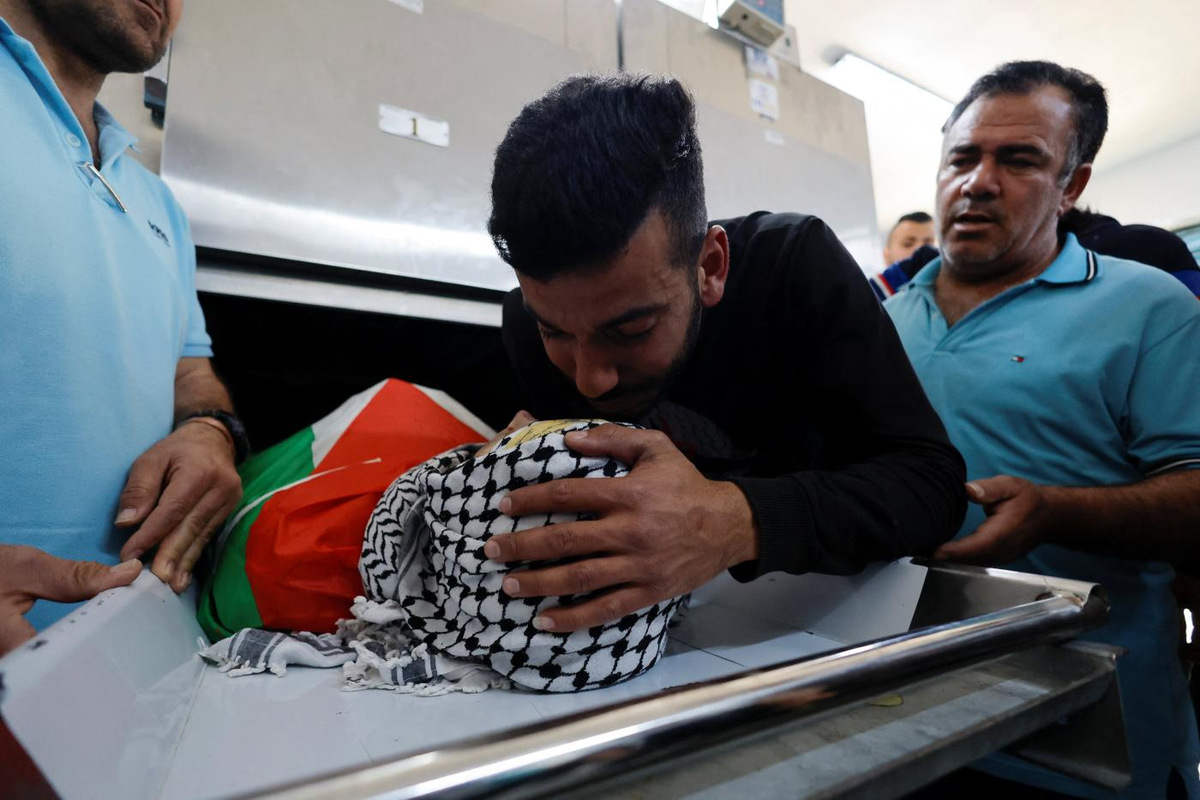Update Israeli Military Attack
Don't forget the history of Jenin
Israels raids on Jenin continues a legacy of indigenous erasure.
April 18, 2022 · 5 min reading
A father in Jenin mourns over the body of his dead son after an Israeli assault on the community took his life.

A father in Jenin mourns over the body of his dead son after an Israeli assault on the community took his life.
As the highest echelons of Israeli society called for unbridled violence to rain down onto Palestinians, Israeli forces immediately responded by killing 14 Palestinians over the next two weeks. Meanwhile, settlers and soldiers rampaged through Hebron, Nablus, and poured into the community of Jenin. As Jenin remains a target of Israeli violence, it's important to remember the horrors of the Jenin massacre from two decades ago and how that history continues to impact the community.
In 2002, the Israeli military executed an uncompromising campaign of violence across Palestinian communities, murdering nearly 500 and injuring 1,500 men, women, and children from March to May. On April 3, 2002, the Israeli launched a violent military operation into the Jenin refugee camp, which housed some 14,000 refugees. It was an act of Israeli violence that, even in the context of the Second Intifada, was unprecedented.
The stories of the Jenin massacre represent the ultimate goal of Israel's program of settler colonialism: Indigenous elimination. Like every other settler-colonial society, whether it be Canada, the United States, or South Africa, the structure of settler-colonialism is designed to pursue the elimination of the Indigenous people — whether through violence, displacement, or assimilation — the goal is erasure.
During the Israeli invasion of Jenin, much like today, Israeli armed forces killed children in the streets. Israeli settlers shot Muhammad Hawashin, only 14 years old, in the face twice, killing him. He was walking with a group of women and children to visit a hospital in Jenin.
They also killed Palestinians who were visibly disabled. Kamal Zghair, who was almost 60 and required a wheelchair, was first shot by the Israeli military and then run over by an army tank on April 10. According to a Human Rights Watch investigation, when the Israelis killed Kamal, he was wheeling himself down the road to his home, carrying a white flag.
When the Israelis took siege of Jenin, the theoretical designation of "civilian" didn't apply. They followed their old playbook, the 1948 Plan Dalet model of engagement: eliminate the Indigenous communities by any means necessary. On April 5, Israeli soldiers when to the home of Afaf Disuqi, knocked on his door, and when Afaf appeared, they detonated a bomb - mutilating his body in front of his family and community. According to reports, the soldiers laughed in public.
Israeli soldiers carried out multiple summary executions. They killed Jamal Al-Sabbagh while ordering him to take off his clothes. They murdered 22-year-old Munthir al-Haj, and were about to watch him bleed to death as he attempted to drag himself into a nearby hospital. Becoming impatient, an Israeli soldier opened fire from a military tank.
On April 6, the Israeli military fired missiles from helicopters into residential areas. This wanton directive led to the killing of a Palestinian woman in her home, and injuring another 4-year-old. Israel's rampant bombing and the bulldozing of people's homes destroyed over 140 buildings, and another 200 others were damaged so badly they were no longer safe to live in. With the intention of inflicting extreme damage, the military was literally crushing people under the rubble when bulldozing the homes over. Israeli bulldozers ran over Jamal Fayid, a paralyzed man in his house, killing him in the process. Muhammad Abu Saba'a, 65 years old, begged the military to stop destroying his home with his family inside. The Israeli shot and killed him. This absolute nightmare that the Israeli military enacted on the geographically small, highly populated community of Jenin camp left over 25% of the people homeless.
And while this litany of Israeli killings in Jenin has shaped the lives of untold Palestinians, it has not rendered the Palestinians powerless or their allies hopeless.
As we remember the Jenin massacre twenty years on in the wake of renewed, targeted violence in Jenin and across Historic Palestine, we know that coordinated resistance is essential to bring us into a just future. Through the Palestinian-led Campaign to Defund Racism, we are not just advocating structural change for policies that can lay the groundwork for decolonization; we are also building global networks based on principled solidarity and a shared vision of a world in which all people are equal. While these periods of heightened violence and death can make us feel disempowered, they also remind us of the urgency of action — the crucial nature of our call to disrupt colonization and elimination of Indigenous Palestinian.
Your support is essential to be able to continue the urgent, deeply needed work of disrupting settler-colonialism and the violence it requires to carry on.
We wish to commemorate those killed this week by Israeli forces. We will not forget them.
Sha's Kamamji, Jenin. Moustafa Abu Roub, Jenin. Omar Alyan (20), Silwad, Ramallah. Qusai Hamamra (16), Husan, Bethlehem. Mohammed Assaf (34), Nablus. Ghada Sabateen (47), Husan. Maha Kathem Awad Zaatari (24), Hebron. Mohammed Zakarna (17), Jenin. Ahmad al Saadi (25), Jenin. Muhammad Ali Ghonneim (19), al Khader, Bethlehem. Abdallah Srour (40), Hebron.
Support
The Good Shepherd Collective rejects pursuing funding from large granting organizations or state funds. Rather, we premise all the work we do on committed, individual donors — people who are willing to donate 5, 10, or 30 dollars every month. We need folks like you to build this work on the ground and abroad. Click here today to make that commitment of solidarity.
Join our mailing list to receive updates and news about Palestine.

